- Home
- Greg Keyes
The Infernal City
The Infernal City Read online
ALSO BY GREG KEYES
THE KINGDOMS OF THORN AND BONE
The Born Queen
The Blood Knight
The Charnel Prince
The Briar King
STAR WARS: THE NEW JEDI ORDER
Star Wars: The New Jedi Order:
Edge of Victory III: The Final Prophecy
Star Wars: The New Jedi Order:
Edge of Victory I: Conquest
Star Wars: The New Jedi Order:
Edge of Victory II: Rebirth
For my daughter,
Dorothy Nellah Joyce Keyes.
Welcome, Nellah.
ACKNOWLEDGMENTS
I would first like to thank everyone involved in The Elder Scrolls for such rich material to work with. Specifically, thanks to Kurt Kuhlmann, Bruce Nesmith, Pete Hines, and Todd Howard for their input and guidance. I would be remiss to neglect mentioning the Imperial Library website, which was also an invaluable resource in writing this book.
As always, thanks to my agent, Richard Curtis. Thanks to my friend Annaïg Houesnard for being a good sport about me lifting her name.
Thanks also to my editor, Tricia Narwani, editorial assistant Mike Braff, and copy editor Peter Weissman, production manager Erin Bekowies, production editor Shona McCarthy, marketing manager Ali T. Kokmen, publicist David Moench, and, of course, the publisher, Scott Shannon. For the wonderful cover, thanks go out to illustrator Paul Youll and designer Dreu Pennington-McNeil.
PROLOGUE
When Iffech felt the sea shudder, he knew. The wind had already fallen like a dead thing from the sky, gasping as it succumbed upon the iron swells, breathing its last to his mariner’s ears. The sky always knew first; the sea was slow—dreadful slow—to come around.
The sea shook again—or, rather, seemed to drag beneath their keel. Up in the crow’s nest Keem screamed as he was tossed out like a kitten. Iffech watched him twist and almost impossibly catch the rigging with those Cathay Raht claws of his.
“Stendarr!” Grayne swore, in her South Niben twang. “What was that? A tsunami?” Her feeble human gaze searched out through the dusk.
“No,” Iffech murmured. “I was off the Summerset Isles when the sea tried to swallow them, and I felt one of those pass under us. And another, when I was younger, off the coast of Morrowind. In deep water you don’t feel much. This is deep water.”
“Then what?” She brushed her silver and gray bangs off her useless eyes.
Iffech twitched his shoulders in imitation of a human shrug and ran his claws through the patchy fur of his forearm. The still air smelled sweet, like rotting fruit.
“See anything, Keem?” he called up.
“My own death, nearly,” the Ne Quin-alian cat shouted back, his voice rasping hollow, as if the ship was in a box. He lithely hauled his sleek body back into the nest. “Nothing on the sea,” he continued after a moment.
“Under it, then,” Grayne said nervously.
Iffech shook his head. “The wind,” he said.
And then he saw it, in the south, a sudden blackness, a crackle of green lightning, and then a form like a tall thunderhead billowed into being.
“Hold on!” he shouted.
And now came a clap like thunder but forty times louder, and a new fist of wind that snapped the mainmast, taking poor Keem to the death he had nearly seen. Then all was still again, except for the roaring in his damaged ears.
“By the gods, what can it be?” he barely heard Grayne ask.
“The sea doesn’t care,” Iffech said, watching the dark mass move toward them. He looked around his ship. All of the masts were broken, and it appeared that half the crew was already gone.
“What?”
“Not many Khajiit take to the sea,” he said. “They’ll bear it for trade, to move skooma around, but few there are who love her. But I’ve adored her since I could mewl. And I love her because she doesn’t care what the gods or daedra think. She’s another world, with her own rules.”
“What are you going on about?”
“I’m not sure,” he admitted. “I feel it, I don’t think it. But don’t you think—doesn’t it feel like …” He didn’t finish. He didn’t need to.
Grayne stared out toward the thing.
“I see it, now,” she said.
“Yes.”
“I saw an Oblivion gate open once,” she said. “When my father worked in Leyawiin. I saw things—it feels a little like that. But Martin’s sacrifice—they say it can’t happen again. And it doesn’t look like a gate.”
It wasn’t shaped like a thunderhead, Iffech realized. More like a fat cone, point down.
Another wind was starting up, and on it something unbelievably foul.
“It doesn’t matter what it is,” he said. “Not to us.”
And a few instants later it didn’t.
Sul’s throat hurt, so he knew he had been screaming. He was soaked with sweat, his chest ached, and his limbs were trembling. He opened his eyes and forced his head up so he could see where he was.
A man stood in the doorway with a drawn sword. His eyes were very wide and blue beneath a shock of curly, barley-colored hair. Swearing, Sul reached for his own weapon where it hung on the bedpost.
“Just hold on there,” the fellow said, backing up. “It’s just you’ve been hollering so, I was worried something was happening to you.”
The dreamlight was still fading, but his mind was starting to turn. If the fellow had wanted him dead, he probably would be.
“Where am I?” he asked, taking a grip on his longsword, despite his reasoning.
“In the Lank Fellow Inn,” the man replied. And then, after a pause, “In Chorrol.”
Chorrol. Right.
“Are you okay?”
“I’m fine,” Sul said. “Nothing to concern you.”
“Ah, yes.” The man looked uncomfortable, “Do you, umm, scream like that every—”
“I won’t be here tonight,” Sul cut him off. “I’m moving on.”
“I didn’t mean to offend.”
“You didn’t,” Sul replied.
“The breakfast is out, down there.”
“Thank you. Please leave me.”
The man closed the door. Sul sat there for a moment rubbing the lines in his forehead. “Azura,” he murmured. He always knew the prince’s touch, even when it was light. This had not been light.
He closed his eyes and tried to feel the sea jump beneath him, to hear the old Khajiit captain’s words, see again through his eyes. That thing, appearing in the sky—everything about it stank of Oblivion. After spending twenty years there, he ought to know the smell.
“Vuhon,” he sighed. “It must be you, Vuhon, I think. Why else would the prince send me such a vision? What else would matter to me?”
No one answered, of course.
He remembered a little more, after the Khajiit had died. He had seen Ilzheven as he last saw her, pale and lifeless, and the smoking shatterlands that had once been Morrowind. Those were always there in his dreams, whether Azura meddled with them or not. But there had been another face, a young man, Colovian probably, with a slight bend in his nose. He seemed familiar, as if they had met somewhere.
“That’s all I get?” Sul asked. “I don’t even know which ocean to look in.” The question was directed at Azura, but he knew it was rhetorical. He also knew he was lucky to get even that. He dragged his wiry gray body out of bed and went over to the washbasin to splash water in his face and blink red eyes at himself in the mirror. He started to turn away when he noticed, behind him in the reflection, a couple of books propped in an otherwise empty shelf. He turned, walked over, and lifted the first.
TALES OF SOUTHERN WATERS, it announced.
He nodded his he
ad and opened the second.
THE MOST CURRENT AND HIGH ADVENTURES OF PRINCE ATTREBUS, this one read.
And there, on the frontispiece, was an engraving of a young man’s face with a slightly crooked nose.
For the first time in years Sul uttered a hoarse laugh. “Well, there you go,” he said. “I’m sorry I doubted you, my Prince.”
An hour later, armed and armored, he rode south and east, toward madness, retribution, and death. And though he had long ago forgotten what happiness was, he imagined it must have been a bit like what he felt now.
ONE
A pale young woman with long ebon curls, and a male with muddy green scales and chocolate spines, crouched on the high rafters of a rotting villa in Lilmoth, known by some as the Festering Jewel of Black Marsh.
“You’re finally going to kill me,” the reptile told the woman. His tone was thoughtful, his saurian features composed in the faint light bleeding down through the cracked slate roof.
“Not so much kill you as get you killed,” she answered, pushing the tight rings of her hair off her face and pressing her slightly aquiline nose and gray-green gaze toward the vast open space beneath them.
“It works out the same,” the other hissed.
“Come on, Glim,” Annaïg said, tossing herself into her father’s huge leather chair and clasping her hands behind her neck. “We can’t pass this up.”
“Oh, I think it can be safely said that we can,” Mere-Glim replied. He lounged on a low weavecane couch, one arm draped so as to suspend over a cypress end table whose surface was supported by the figure of a crouching Khajiit warrior. The Argonian was all silhouette, because behind him the white curtains that draped the massive bay windows of the study were soaked in sunlight.
“Here are some things we could do instead.” He ticked one glossy black claw on the table.
“Stay here in your father’s villa and drink his wine.” A second claw came down. “Take some of your father’s wine down to the docks and drink it there.” The third. “Drink some here and some down at the docks …”
“Glim, how long has it been since we had an adventure?”
His lazy lizard gaze traveled over her face.
“If by adventure you mean some tiring or dangerous exercise, not that long. Not long enough anyway.” He wiggled the fingers of both hands as if trying to shake something sticky off them, a peculiarly Lilmothian expression of agitation. The membranes between his digits shone translucent green. “Have you been reading again?”
He made it sound like an accusation, as if “reading” was another way of referring to, say, infanticide.
“A bit,” she admitted. “What else am I to do? It’s so boring here. Nothing ever happens.”
“Not for lack of your trying,” Mere-Glim replied. “We very nearly got arrested during your last little adventure.”
“Yes, and didn’t you feel alive?” she said.
“I don’t need to ‘feel’ alive,” the Argonian replied. “I am alive. Which state I would prefer to retain.”
“You know what I mean.”
“Hff. That’s a bold assertion,” he sniffed.
“I’m a bold girl.” She sat forward. “Come on, Glim. He’s a were-crocodile. I’m certain of it. And we can get the proof.”
“First of all,” Mere-Glim said, “there’s no such thing as a were-crocodile. Second, if there were, why on earth would we care to prove it?”
“Because … well, because people would want to know. We’d be famous. And he’s dangerous. People around there are always disappearing.”
“In Pusbottom? Of course they are. It’s one of the dodgiest parts of town.”
“Look,” she said. “They’ve found people bitten in half. What else could do that?”
“A regular crocodile. Lots of things, really. With some effort, I might be able to do it, too.” He fidgeted again. “Look, if you’re so sure about this, get your father to talk Underwarden Ethten into sending some guards down there.”
“Well, what if I’m wrong? Father would look stupid. That’s what I’m saying, Glim. I need to know for sure. I must find some sort of proof. I’ve been following him—”
“You’ve what?” He gaped his mouth in incredulity.
“He looks human, Glim, but he comes and goes out of the canal like an Argonian. That’s how I noticed him. And when I looked where he came out—I’m sure the first few steps were made by a crocodile, and after that by a man.”
Glim closed his mouth and shook his head.
“Or a man stepped in some crocodile tracks,” he said. “There are potions and amulets that let even you gaspers breathe underwater.”
“But he does it all the time. Why would he do that? Help me be sure, Glim.”
Her friend sibilated a long hiss. “Then can we drink your father’s wine?”
“If he hasn’t drunk it all.”
“Fine.”
She clapped her hands in delight. “Excellent! I know his routine. He won’t be back in his lair until nightfall, so we should go now.”
“Lair?”
“Sure. That’s what it would be, wouldn’t it? A lair.”
“Fine, a lair. Lead on.”
And now here we are, Annaïg thought.
They had made their way from the hills of the old Imperial quarter into the ancient, gangrenous heart of Lilmoth—Pusbottom. Imperials had dwelt here, too, in the early days when the Empire had first imposed its will and architecture on the lizard people of Black Marsh. Now only the desperate and sinister dwelt here, where patrols rarely came: the poorest of the poor, political enemies of the Argonian An-Xileel party that now dominated the city, criminals and monsters.
They found the lair easily enough, which turned out to be a livable corner of a manse so ancient the first floor was entirely silted up. What remained was vastly cavernous and rickety and not that unusual in this part of town. What was odd was that it wasn’t full of squatters—there was just the one. He had furnished the place with mostly junk, but there were a few nice chairs and a decent bed.
That’s about all they got to see before they heard the voices, coming in the same way they had—which was to say the only way. Annaïg and Glim were backed up in the corner, and here the walls were stone. The only way to go was up an old staircase and then even farther, using the ancient frame of the house as a ladder. Annaïg wondered what sort of wood—if wood it was—could resist decomposition for so long. The wall-and floorboards here had been made of something else, and were almost like paper.
So they had to take care to stay on the beams.
Glim hushed himself; the figures in the group below were gazing up—not at them, but in their vague direction.
Annaïg took a small vial from the left pocket of her double-breasted jacket and drank its contents. It tasted a bit like melon, but very bitter.
She felt her lungs fill and empty, the elastic pull of her body around her bones. Her heart seemed to be vibrating instead of beating, and the oddest thing was, she couldn’t tell if this was fear.
The faint noises below suddenly became much louder, as if she was standing among them.
“Where is he?” one of the figures asked. They were hard to make out in the dim light, but this one looked darker than the rest, possibly a Dunmer.
“He’ll be here,” another said. He—or maybe she—was obviously a Khajiit—everything about the way he moved was feline.
“He will,” a third voice said. Annaïg watched as the man she had been following for the last few days approached the others. Like them, he was too far away to see, but she knew him by the hump of his back, and her memory filled in the details of his brutish face and long, unkempt hair.
“Do you have it?” the Khajiit asked.
“Just brought it in under the river.”
“Seems like a lot of trouble,” the Khajiit said. “I’ve always wondered why you don’t use an Argonian for that.”
“I don’t trust ’em. Besides, they have ripper eels traine
d to hunt Argonians trying to cross the outer canal. They’re not so good at spotting me, especially if I rub myself with eel-slime first.”
“Disgusting. You can keep your end of the job.”
“Just as long as I get paid for it.” He pulled off his shirt and removed his hump. “Have a look. Have a taste, if you want.”
“Oh, daedra and Divines,” Annaïg swore, from the beam they crouched on. “He’s not a were-croc. He’s a skooma smuggler.”
“You’re finally going to kill me,” Glim said.
“Not so much kill you as get you killed.”
“It works out the same.”
And now Annaïg was quite sure that what she felt was fear. Bright, terrible, animal fear.
“By the way,” the Khajiit below said, lowering his voice. “Who are those two in the rafters?”
The man looked up. “Xhuth! if I know,” he said. “None of mine.”
“I hope not. I sent Patch and Flichs up to kill them.”
“Oh, kaoc’,” Annaïg hissed. “Come on, Glim.”
As she stood, something wisped through the air near her, and a shriek tore out of her throat.
“I knew it,” Glim snapped.
“Just—come on, we have to get to the roof.”
They ran across the beams, and someone behind her shouted. She could hear their footfalls now—why hadn’t she before? An enchantment of some sort?
“There.” Glim said. She saw it; part of the roof had caved in and was resting on the rafters, forming a ramp. They scrambled up it. Something hot and wet was trying to pull out of her chest, and she hysterically wondered if an arrow hadn’t hit her, if she wasn’t bleeding inside.
But they made it to the roof.
And a fifty-foot fall.
She pulled out two vials and handed one to Mere-Glim.
“Drink this and jump,” she said.
“What? What is it?”
“It’s—I’m not sure. It’s supposed to make us fly.”
“Supposed to? Where did you get it?”

 Godzilla
Godzilla Godzilla vs. Kong
Godzilla vs. Kong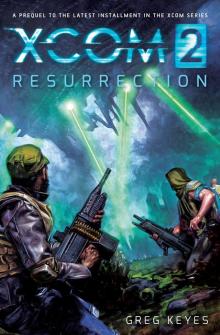 XCOM 2- Resurrection
XCOM 2- Resurrection Independence Day: Crucible (The Official Prequel)
Independence Day: Crucible (The Official Prequel)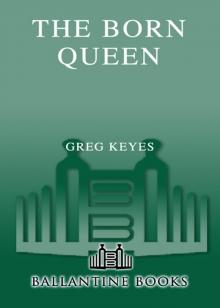 The Born Queen
The Born Queen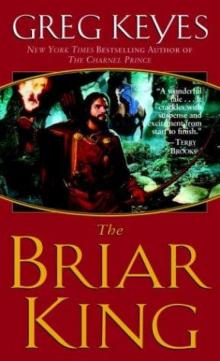 The Briar King
The Briar King Star Wars The New Jedi Order - Dark Journey - Book 10
Star Wars The New Jedi Order - Dark Journey - Book 10 Star Wars: New Jedi Order Book 8b: Emissary of the Void
Star Wars: New Jedi Order Book 8b: Emissary of the Void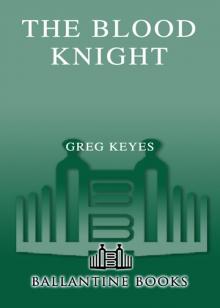 The Blood Knight
The Blood Knight Star Wars - Edge of Victory - Book 1: Conquest
Star Wars - Edge of Victory - Book 1: Conquest Edge of Victory 2 Rebirth
Edge of Victory 2 Rebirth Lord of Souls: An Elder Scrolls Novel
Lord of Souls: An Elder Scrolls Novel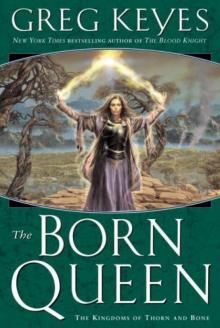 The Born Queen tkotab-4
The Born Queen tkotab-4 Rebirth: Edge of Victory II
Rebirth: Edge of Victory II Conquest: Edge of Victory I
Conquest: Edge of Victory I Emissary of the Void
Emissary of the Void The Blackgod
The Blackgod Star Wars The New Jedi Order - The Final Prophecy - Book 19
Star Wars The New Jedi Order - The Final Prophecy - Book 19 The Infernal City
The Infernal City The Charnel Prince
The Charnel Prince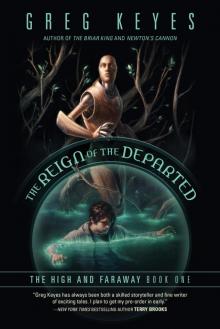 The Reign of the Departed
The Reign of the Departed Lord of Souls es-2
Lord of Souls es-2 Chosen of the Changeling
Chosen of the Changeling Dawn of the Planet of the Apes
Dawn of the Planet of the Apes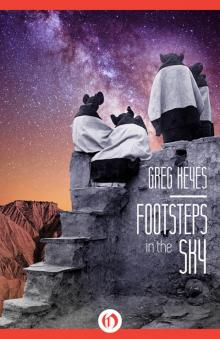 Footsteps in the Sky
Footsteps in the Sky PACIFIC RIM UPRISING ASCENSION
PACIFIC RIM UPRISING ASCENSION The Final Prophecy: Edge of Victory III
The Final Prophecy: Edge of Victory III